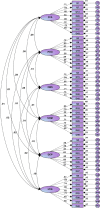Assessing reliability and validity of the Chinese version of the Crown-Crisp Experience Index and its application in pneumoconiosis patients
- PMID: 37072712
- PMCID: PMC10111717
- DOI: 10.1186/s12888-023-04731-x
Assessing reliability and validity of the Chinese version of the Crown-Crisp Experience Index and its application in pneumoconiosis patients
Abstract
In China, among all patients with occupational diseases, 90% have pneumoconiosis. The disease, which leads to psychological problems, seriously affects patients' lives. The Crown-Crisp Experience Index (CCEI) is a multidimensional questionnaire to assess patients' psychological conditions. Yet there is no Chinese version of CCEI. This study, therefore, aims to develop a Chinese CCEI, in line with standard localization procedures, by translating, back-translating, and culturally adapting the original English version. The final Chinese version comprises 47 items in six dimensions. The reliability and validity of the Chinese CCEI were tested by analyzing the data collected from 1,000 pneumoconiosis patients from an occupational disease prevention and treatment hospital. A rank sum test was carried out to compare the phobic anxiety (PHO) between pneumoconiosis patients and retired miners. The results of exploratory factor analysis show six principal components, which explain a total of 78.246% variances. Confirmatory factor analysis shows that the Chi-square freedom ratio (χ2/df) were less than 3, the root mean square error approximation (RMSEA) were less than 0.05, comparative fit Index(CFI) and incremental fit index (IFI) were greater than 0.9, average variance extracted(AVE) in six dimensions were less than 0.5, residual variances(CR) were greater than 0.8, Cronbach's alpha coefficient 0.839, Omega ω coefficient 0.889, and S-CVI 0.88. The PHO of pneumoconiosis patients was significantly higher than that of retired miners exemplified by a statistical difference (P < 0.05). The study shows that the Chinese version of CCEI enjoys a high degree of reliability and validity and thus can be used as a screening tool for measuring patients' anxiety and fear levels.
Keywords: Anxiety; Factor analysis; Phobia; Pneumoconiosis.
© 2023. The Author(s).
Conflict of interest statement
The authors declare no competing interests.
Figures
Similar articles
-
Validity and Reliability of a Simplified Chinese Version of Cancer Survivors' Unmet Needs Scale (CaSUN).Psychooncology. 2024 Oct;33(10):e70008. doi: 10.1002/pon.70008. Psychooncology. 2024. PMID: 39439045
-
Reliability and validity of the Chinese version of the coronary artery disease empowerment scale (CADES) in patients with coronary artery disease after percutaneous coronary intervention.BMC Cardiovasc Disord. 2024 Aug 23;24(1):438. doi: 10.1186/s12872-024-04114-4. BMC Cardiovasc Disord. 2024. PMID: 39174926 Free PMC article.
-
The transcultural adaptation and validation of the Chinese version of the Oral Health Literacy Scale for Diabetic Patients.BMC Oral Health. 2024 Feb 7;24(1):198. doi: 10.1186/s12903-024-03965-9. BMC Oral Health. 2024. PMID: 38326830 Free PMC article.
-
Psychometric properties of the Coronavirus Anxiety Scale based on Classical Test Theory (CTT) and Item Response Theory (IRT) models among Chinese front-line healthcare workers.BMC Psychol. 2023 Aug 7;11(1):224. doi: 10.1186/s40359-023-01251-x. BMC Psychol. 2023. PMID: 37550697 Free PMC article.
-
Prevention and Treatment of Pneumoconiosis in the Context of Healthy China 2030.China CDC Wkly. 2023 Oct 13;5(41):927-932. doi: 10.46234/ccdcw2023.162. China CDC Wkly. 2023. PMID: 37970069 Free PMC article. Review. No abstract available.
Cited by
-
Assessment of psychological support in patients with unilateral peripheral hypofunction.Sci Rep. 2025 Jul 26;15(1):27231. doi: 10.1038/s41598-025-12930-7. Sci Rep. 2025. PMID: 40715568 Free PMC article.
References
Publication types
MeSH terms
LinkOut - more resources
Full Text Sources
Medical
Miscellaneous



